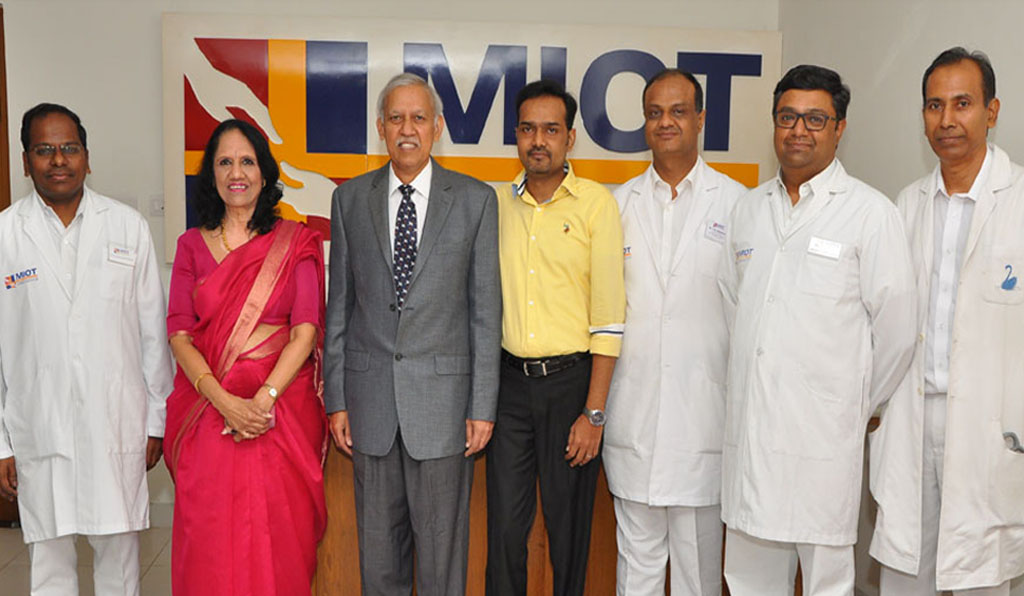Past events at MIOT
Successful Treatment of Recurrent FSGS Following Kidney Transplantation.
Successful treatment of recurrent FSGS (Focal Segmental Glomerulosclerosis) following kidney transplantation on a 41 year old patient (male) identified with Nephrotic Syndrome.

Seen in the photograph from left to right: Dr. Shanmuga Sundaram R, HOD – Department of Urology, Mrs. Mallika Mohandas, Chairman – MIOT International, Dr. Rajan Ravichandran, Director – MIOT Institute of Nephrology, Mr. Girish (Patient who underwent Kidney Transplant), Dr. C.N. Srinivas, Director Laboratory Medicine, Head Transplantation Immunology and Molecular Diagnostics, Dr. Paari Vijayaraghavan, Hepato-Biliary & Solid Organ Transplant Surgeon and Dr. Kanakaraj, Consultant Nephrologist.
In 2001, Mr. Girish (who is into e-publishing and an active cricketer) had swelling in his ankle post a regular cricket match. The swelling was very unusual for a sprain as it had fluid accumulation plus muscle pain on both legs. Later in the evening when Girish consulted a nearby physician he set aside any issues with the heart and directed Girish to a nephrologist. After investigation Girish was briefed that he has “Nephrotic Syndrome” as his 24 hrs urine showed 8gms of protein. He was put under regular medication for Nephrotic Syndrome but with no clarity on the reason for protein leak.
(Nephrotic Syndrome is massive leakage of protein in the urine with swelling of the whole body and very low albumin (protein) in the blood. This can lead on to end stage kidney diseases.)
Later Girish moved to USA and followed the medication under the guidance of a local nephrologist. He underwent a biopsy and learnt that the reason for his Nephrotic Syndrome is due to Primary FSGS (Focal Segmental Glomerulosclerosis) caused by an (unknown circulating factor in the blood) auto immune disease.
Primary FSGS (Focal Segmental Glomerulosclerosis):
Primary FSGS is a rare disease that attacks the kidney’s filtering units (nephrons).Each kidney is made up of approximately one million tiny filters called “nephrons.” Much as a coffee filter keeps coffee grounds in, nephrons filter the blood, taking out the fluid & minerals which becomes urine and leaving the protein and cells in the blood. When nephrons become damaged or scarred (sclerosis), proteins begin leaking/lost into the urine (proteinuria).
Primary FSGS is one of the causes for the serious “Nephrotic Syndrome” condition. This condition may not respond to treatment and can progress to end stage requiring Kidney Transplantation. The danger of kidney transplantation in such patients with Primary FSGS is the recurrence of the disease very soon after transplantation even on the operation table.
Girish and his family took time to come to terms with the reality. His medications were changed and he was relieved for few years during the remission period until 2008. Between 2008 & 2010 there were few episode of protein loss.
Later in 2010,he relocated to Chennai and started his consultation with
Dr. Rajan Ravichandran at MIOT Hospitals. But in early 2013, Girish had to start with dialysis – 3 days per week schedule.
On Jan 2017, Girish underwent Cadaver Kidney Transplant at MIOT Hospitals under the team of doctors comprising of Dr. Rajan Ravichandran (Director – MIOT Institute of Nephrology), Dr. Paari Vijayaraghavan (Hepato-Biliary & Solid Organ Transplant Surgeon) and Dr. Kanakaraj (Consultant Nephrologist).
Post the successful Kidney Transplant the Primary FSGS reoccurred within the first week (as anticipated) and it is very difficult to treat Primary FSGS when it reoccurs in the first week itself. Usually such kidneys are lost and patient goes back on dialysis. But because of the early detection and aggressive treatments like Plasmapheresis, special antibody injections and modification in immunosuppressive drugs, Girish has done well with normal (new) kidney function and reduction in protein loss.
A couple of years back in UK, under similar scenario when Primary FSGS reoccurred in a patient, the kidney was transplanted to another patient and it started working without any protein leak. This proves the theory of circulating factor in Primary FSGS – thereby indicating that the problem lies within the patients circulating factor in the body and not with the kidney.
Research about FSGS and recent developments:
FSGS is usually “idiopathic or primary,” which means it arises without a known cause. There are some known genetic causes of Primary FSGS, with new gene variants continually being discovered.
Researches (at Harvard-affiliated Massachusetts General Hospital) are underway to determine what exactly these unknown/abnormal components in the blood (caused by the circulating factors) which is damaging specifically the nephrons (filtering units) in the kidney thereby causing Primary FSGS.
An important recent development in the world is the ligation of the tubes from the old kidneys (native) so that the protein loss can be differentiated whether it is from the old (native) or new kidney (transplanted one)and successful treatment can be installed. This technique is successfully followed by Mayo Clinic in the USA.
Percent of population with FSGS
More than 5400 patients are diagnosed with FSGS every year; however, this is considered an underestimate because:
- a limited number of biopsies are performed
- the number of FSGS cases are rising more than any other cause of Nephrotic Syndrome
FSGS occurs more frequently in adults than in children.
What is Plasmapheresis?
It is a special form of dialysis where the plasma (liquid portion of blood with abnormal component/antibodies which causes the FSGS) is filtered from the blood. The lost plasma are replaced with albumin or fresh frozen plasma and administered to the patient. In regular dialysis the waste products in the blood are only removed and not the plasma.



